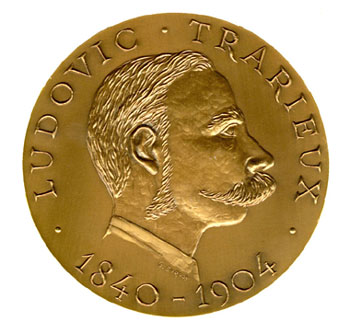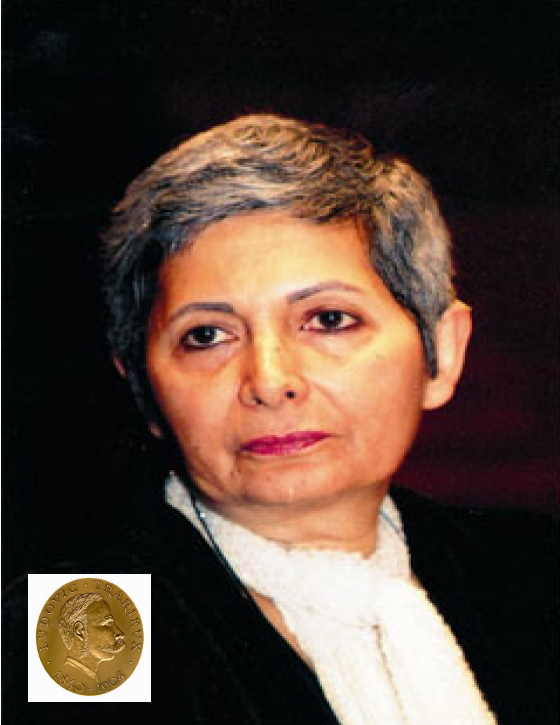

Ludovic Trarieux Historical account The Prize 2000 The Prize 2002 The Prize 2003 The Prize 2004 The Prize 2005 Le Livre d'Or

|
|

|

Mehrangiz Kar
one of the most prominent women's rights lawyer in Iran,
Ludovic Trarieux Prize Winner 2002

photo ludovictrarieux.org
On May 23 2002, the jury of " Ludovic Trarieux International Human Rights Prize " awarded the Prize 2002 to the iranian lawyer Mehrangiz Kar. *
Mehrangiz KAR, is a human rights lawyer, writer, essayist, and former editor of the now-banned Zan literary review. Her work as an activist for women's rights often put her in conflict with Iranian authorities. Kar has published widely on women's issues in Iran. Her publications include Children of Addiction: Social and Legal Position of the Children of Addicted Parents in Iran (1990); Quest for Identity: the Image of Iranian Women in Prehistory and History Vol.1 and 11, (Vol.1 1992, volume 11 compiled and ready for print), which she co-edited with Shahla Lahiji, Iran's first woman publisher; Angel of Justice and Patches of Hell, a collection of essays which look at the status and position of women in pre- and post-revolutionary Iran; Women in the Iranian Labor Market (1994); and Legal Structure of the Family System in Iran.
Born in 1944, in Ahvaz, a city in the south of Iran, she moved to Tehran to attend the College of Law and Political Science at the University of Tehran. After graduation, she was employed at the Sazman-e Ta'min-e Ejtemaii [ Institute of Social Security] and in the same time also wrote for the press and published over 100 articles in newspapers and magazines, a great many of them in Ferdowsi magazine. The articles were on social issues, although some were political as well.
Kar was arrested with publisher Shahla Lahiji on April 29, 2000; they were among 19 prominent Iranian writers and intellectuals who were subsequently tried for participating in an academic and cultural conference held at the Heinrich Böll Institute in Berlin on April 7-9 entitled "Iran after the elections," at which political and social reform in Iran were publicly debated.
They were detained in Evin Prison until they were both released on bail on June 21, 2000. They were subsequently tried in a closed session, under conditions grossly short of the minimum international standards for fair trials, and on vaguely worded charges undefined in the law but summarised as "acting against national security" or "spreading propaganda against the regime of the Islamic Republic" in the context of Articles 498 and 500 of the Law of Islamic Punishment. Mehrangiz Kar is to be additionally tried on charges of "violating the Islamic dress code at the Berlin Conference", "denying the commands of the shari‘a" and abusing sacred principles. On January 13, 2001 were convicted and sentenced to four years' imprisonment on charges of acting against national security and disseminating propaganda against the Islamic regime. Kar is believed to have been facing additional charges at the Civil Court for violating the observance of hejab (the full head and body covering required of women), denying its necessity in Islam, and propagating against the Islamic Republic of Iran. Accusations relating to the observance of hejab are reportedly particularly common against women whom the authorities wish to intimidate and harass.
Following her release on bail Ms Kar was diagnosed with breast cancer. She has undergone a masectomy and a course of chemotherapy in Iran but requires urgent medical treatment and surgery overseas.She is currently residing in the United States, where she is receiving ongoing medical treatment for breast cancer. Mehrangiz Kar's appeal hearing concluded in November 2001; however, the verdict was not announced until 2002.
After she arrived in the United States, her husband, journalist Siamak Pourzand, disappeared. He was brought to the phone a number of times to call Mehrangiz and their daughters Leila and Azadeh to pass on the message that they must refrain from speaking on his behalf and must avoid contact with the media. Realizing the more profound danger in submitting to censorship, Mehrangiz and her daughters decided to expose the situation and spoke freely with representatives of the media. Mehrangiz has appeared on PBS television, and has spoken on VOA, BBC, NPR, and numerous European radio networks in the hope that international pressure will help save her husband. Their many attempts to get information concerning Siamak's condition and the status of his case from various government entities and several human rights organizations in Iran has met with failure.
Since Siamak Pourzand went missing on 24 November, and there are unconfirmed reports that he has been arrested by the Iranian intelligence services. It is thought that his disappearance may be connected to his position as manager of the Majmue-ye Farrhangi-ye Honari-ye Tehran, a cultural centre for writers, artists and intellectuals. Pourzand is also known for his articles that are critical of the Islamic regime, and is said to have been recently working with Iranian foreign-based media. Pourzand, aged 70, suffers from diabetes and a heart complaint. [...]» .
However, it was announced by the security forces of the government weeks after his disappearance that Mr. Pourzand presently is in the Jails of Islamic Republic. Still no charges is made public and no legality for his detention A.
In January 8 2002, the final verdict for Shahla Lahiji and Mehrangiz Kar's cases was announced . Both their sentences have been reduced to six months' imprisonment
Siamak Pourzand, was sentenced by the Tehran press court to eight years in prison on May 3, 2002. After a four-month period of detention in which no clear charges were leveled, the 73-year old journalist who ran the Tehran Cultural Centre was put on trial in early March on charges of espionage and threatening national security
Mrs Mehrangiz Kar'snomination fort the Ludovic-Trarieux Award was given by Bad Jens (Iranian feminist
Newsletter).
* Meeting of the Jury of
INTERNATIONAL DES DROITS DE L'HOMME
"LUDOVIC TRARIEUX" 2002
took place
Jeudi
23 mai 2002 Historical account of the Prize
1985 Nelson MANDELA (South Africa) 1992 1994 1996 awarded jointly to Nejib HOSNI (Tunisia) and to Dalila MEZIANE (Algeria). 1998 2000
It's time Interview by J. Javid Mehrangiz Kar attended a conference
in Washington DC, organized by the Middle East Institute on October 2.
She gave a speech on the legal obstacles facing women in Iran. She gave
this interview following the conference. Click to listen to responses (RealAudio,
in Persian). Also see
photos: - On determination
to fight for women's rights - Send a comment for The Iranian letters
section
A la Maison du Barreau
11 Place Dauphine
75000 PARIS
(Peru)
(Bosnia-Herzegovina)
(China)
(Turquie)
Women in Iran fight for their rights
October 21, 1999
The Iranian
- On the importance
of parliamentary elections
- On the shortcomings
of President Khatami
- On greater
participation of Iranian women in politics
